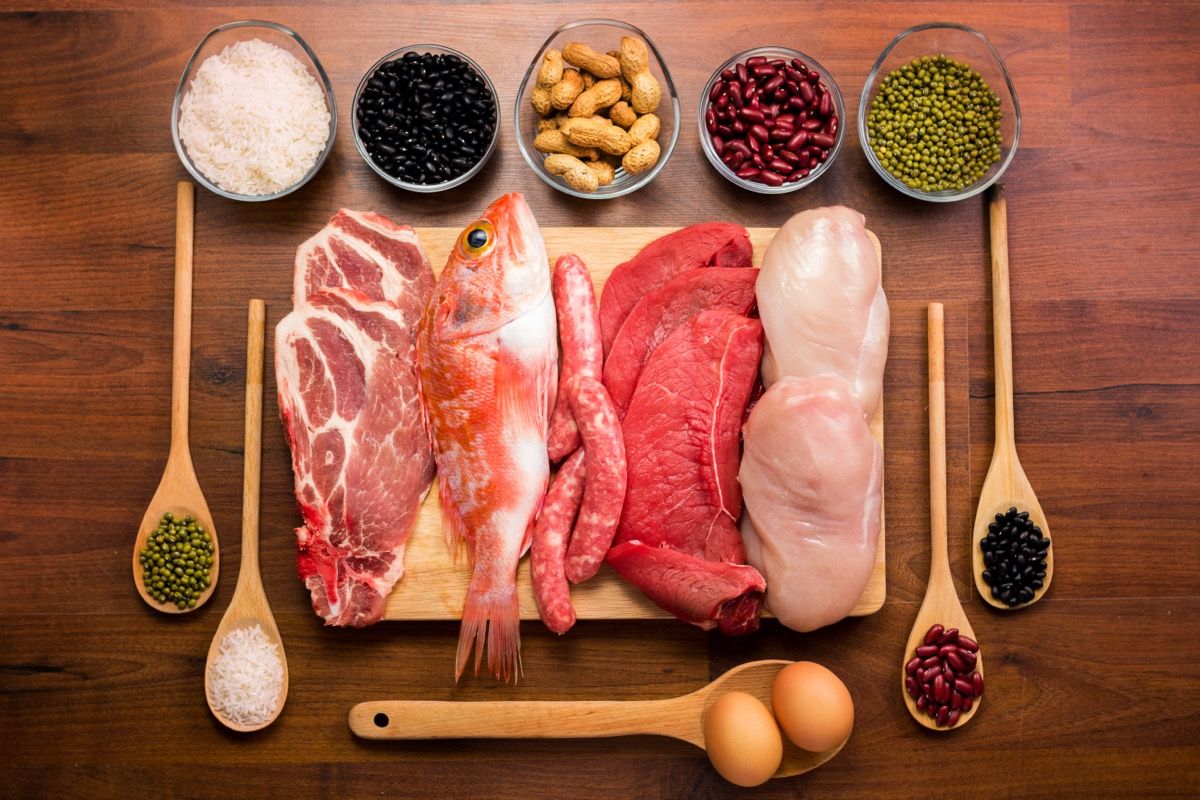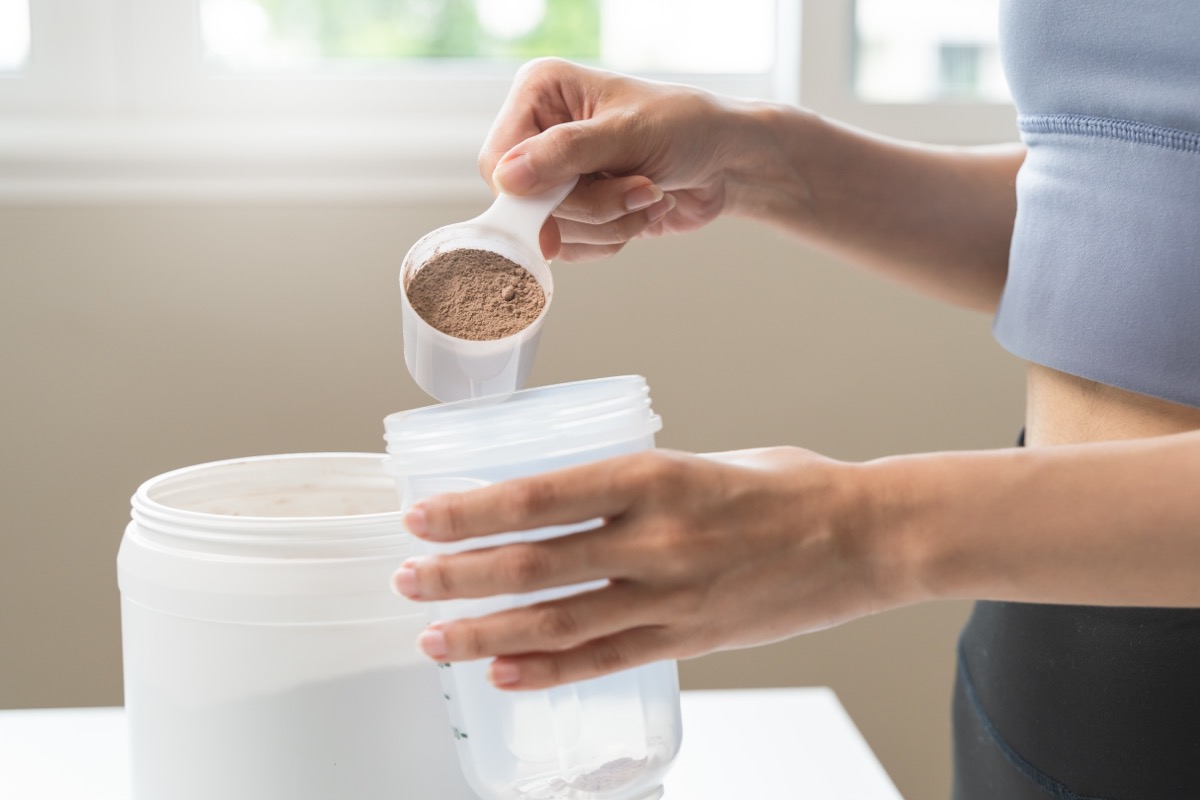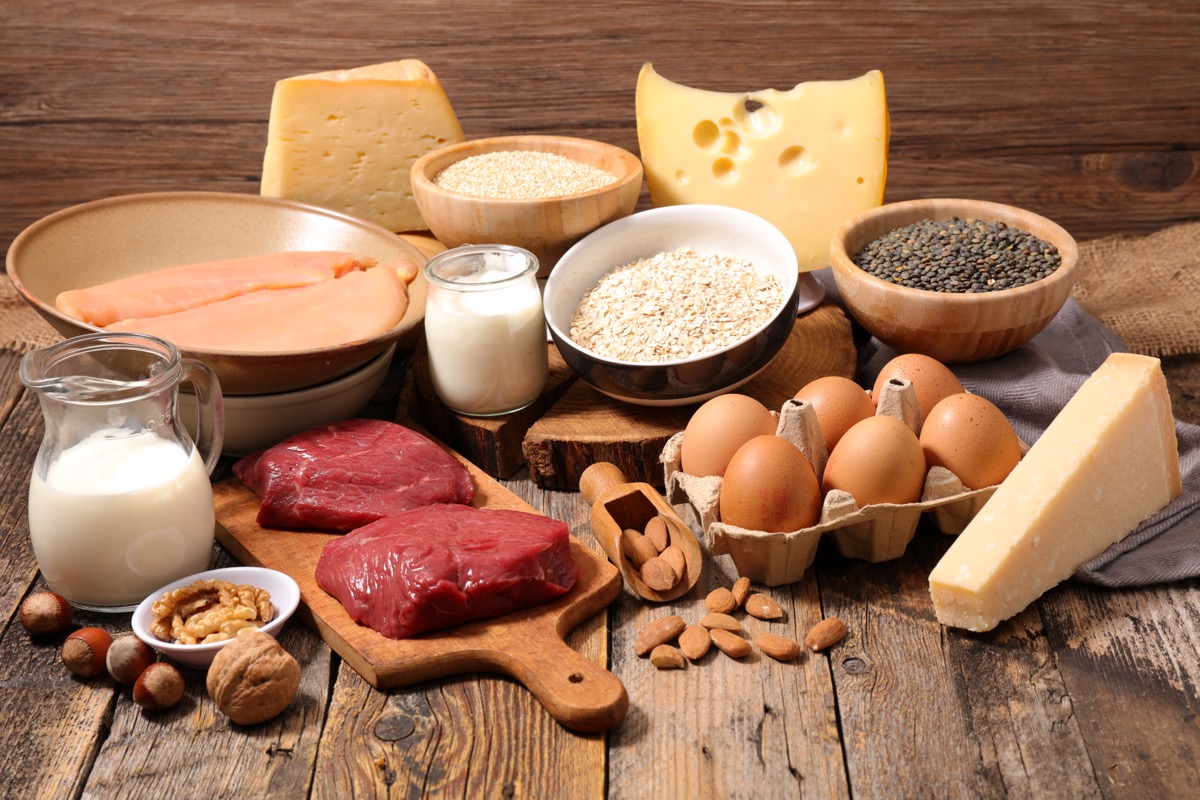7 Protein Deficiency Symptoms, According to Doctors

There are six essential nutrients that your body simply cannot live without: carbohydrates, fats, vitamins, minerals, water, and protein. Take any one of these out of the equation, and your body will cease to function. Limit them, and you’ll likely struggle with symptoms of deficiency. Though many people singularly associate protein with muscle building and maintenance, this nutrient is one of the “essential six” because it’s foundational to many basic body functions and a lack of it can cause many protein deficiency symptoms.
When people fail to get enough protein through their diets or to retain enough protein due to underlying illness, it can affect anything from cell repair to the production of antibodies in the immune system. Understanding protein deficiency can help you spot a problem and get it treated faster. Read on to learn the seven symptoms that could tip you off to hypoproteinemia and what to do about them.
RELATED: 10 Healthiest Superfoods to Add to Your Diet, Nutritionists Say.
Why do our bodies need protein?

Proteins are macronutrient molecules made up of amino acids that our bodies need in order to perform basic functions.
“Protein is critical for every cell in the body. It is a building block for muscle, hair, skin, and nails and helps build and repair tissue in the body,” explains Chris Mohr, PhD, RD, a fitness and nutrition advisor at Fortune Recommends Health.
Raj Dasgupta, MD, chief medical advisor for the National Council on Aging (NCOA), says it’s hard to overstate how heavily our bodies rely on proteins. He notes that they’re also important for “producing enzymes and hormones, defending against illnesses, and transporting essential molecules around the body.”
RELATED: 7 Calcium Deficiency Symptoms, According to Doctors.
What does it mean to have a protein deficiency?

A protein deficiency, also called hypoproteinemia, is a condition in which a person has low protein levels in the blood. “It can occur if a person does not eat enough protein, or has certain health conditions,” explains Dasgupta.
He notes that hypoproteinemia is considered uncommon in high-income countries, where most people eat a somewhat balanced diet. Less severe cases are known as protein insufficiency, and Mohr notes that this diagnosis is much more common in the U.S.
“This means a person might be meeting the minimum requirements, but maybe their intake isn’t optimal or ideal to where it should be,” he explains.
According to the Mayo Clinic, your protein intake should constitute 10 to 35 percent of your overall calorie intake.
Who is most likely to develop a protein deficiency?

Some people are more likely than others to develop a protein deficiency. “Vulnerable groups include people facing poverty-related malnutrition, the elderly, those with eating disorders, and people with liver and kidney damage as well as digestive diseases like Crohn’s or celiac disease that impair nutrient absorption,” explains Dasgupta.
While it is possible to get all the protein you need from plant-based sources, vegans and vegetarians are also more likely to develop a protein deficiency than people who eat meat. People with hypoproteinemia tend to have low-quality diets overall.
How is a protein deficiency diagnosed?

While you might suspect that you have a protein deficiency, the experts say that the only way to know for sure is to request a test from your doctor.
“Diagnosis typically involves reviewing the dietary history and giving blood tests to check the levels of proteins such as albumin and total protein,” says Dasgupta.
Mohr notes that ideally, a doctor’s assessment would also take into account broader lifestyle factors and barriers to sound nutrition.”They would assess or ask questions about the living environment, access to food, and the mental state and overall mood of the individual,” he tells Best Life.
RELATED: 7 Low Magnesium Symptoms to Watch Out For, According to Doctors.
Protein Deficiency Symptoms

So, what happens if you don’t eat enough protein? The answer is that you may develop a set of subtle symptoms that worsen over time.
“The symptoms of very low protein levels in the body can be nonspecific. Many of these symptoms may also indicate other health problems, such as a vitamin deficiency or low iron level,” says Dasgupta, emphasizing the importance of following up with medical testing.
Though there is no single symptom that’s likely to tip you off to hypoproteinemia when noticed in isolation, checking more than a few boxes on the symptom list can begin to paint a picture of deficiency.
1. Weakness or fatigue
Protein helps build muscles and supplies the body with energy, so a lack of protein can translate into weakness or fatigue. In fact, this is among the most common low protein symptoms.
2. Slow-healing wounds
Another sign of low protein is the presence of slow-healing wounds, including cuts, bruises, sprains, and more.
“We need protein to heal wounds or incisions, to make blood cells that carry oxygen or fight infection, and to maintain virtually every cell in the body,” explains the London Health Sciences Center (LHSC).
3. Swelling
If you notice edema—fluid retention and swelling, most often in your lower extremities—this may also signal a lack of protein.
“We have protein in many different forms in our blood stream. Proteins in the blood tend to pull water into our blood vessels (acting like a ‘water magnet’). When the level of protein in the blood is low, water may leave the blood vessels and collect in the tissues,” explains the LHSC.
4. Problems with your hair, skin, or nails
Low protein levels can also begin to affect your hair, skin, and nails. That’s because keratin, collagen, and elastin are all key proteins needed to maintain their health. In particular, you may notice hair loss or hair thinning, dry or flaky skin, or brittle nails.
5. Mood changes
Protein deficiency has also been linked to mood changes, Dasgupta notes.
“Protein consumption (from foods like fish, beef, chicken, turkey, tofu, beans, eggs and unsweetened yogurt) has been linked to higher levels of dopamine and norepinephrine, which are brain chemicals that play a role in your mood, motivation and concentration,” says the Cleveland Clinic.
6. Muscle wasting
Because your body relies on protein to build muscle, muscular atrophy or muscle wasting could also signal a protein deficiency. Even more mild cases of protein insufficiency can lead to muscle atrophy in older adults, affecting mobility and overall health.
7. Immunodeficiency
Finally, protein helps to make antibodies that fight infection when you get sick, meaning that having a protein deficiency can also cause immunodeficiency. If you notice that when you get sick, you stay sick, this is always a symptom worth mentioning to your doctor.
RELATED: 5 Supplements That Can Damage Your Kidneys, Doctors Say.
What conditions are related to protein deficiency?

When protein deficiencies are the result of severe malnutrition, they can cause serious chronic conditions.
“Severe deficiencies can lead to conditions like Kwashiorkor, characterized by swelling, liver enlargement, and skin problems in children, and Marasmus, which involves severe weight loss and muscle wasting due to poor protein and calorie intake,” says Dasgupta.
Mohr says that most people with a low protein intake will not go on to develop conditions like these. “Again, true protein deficiency is very different from protein insufficiency or simply not optimizing protein intake,” he tells Best Life.
What causes a protein deficiency?

There can be several reasons for a person to develop a protein deficiency besides simply eating too little protein. In some cases, it may indicate a condition affecting the liver, kidneys, or gastrointestinal tract.
‘The liver plays a role in processing proteins in the body,” explains Dasgupta. “If the liver is not functioning well, the body may not be able to manufacture enough protein to carry out its vital functions. This can happen in people with certain liver disorders such as cirrhosis.”
Dasgupta says the kidneys also help to maintain adequate protein levels in the body. “The kidneys filter waste products from the blood into the urine. When functioning correctly, the kidneys allow protein to stay in the bloodstream. However, when the kidneys are damaged or are not functioning fully, they may leak protein into the urine,” he explains.
Finally, Crohn’s disease or Celiac disease can cause inflammation in the small intestine. “This is where the body breaks down and absorbs many essential nutrients. Damage to the small intestine can result in nutritional deficiencies and hypoproteinemia,” Dasgupta notes.
If you believe that an underlying condition could be causing your symptoms of deficiency, it’s important to speak with your doctor, who can help you arrive at a diagnosis.
RELATED: 8 Signs You’re Not Getting Enough Iron, Doctors Say.
How can you treat a protein deficiency?

The treatment for your protein deficiency will depend on the root cause. However, the experts agree that your doctor will most likely recommend a targeted plan to increase your protein intake through dietary sources or supplements. This may include eating more meats, fish, dairy, beans, legumes, and protein powders or shakes, Dasgupta says.
Is Hypoproteinemia preventable?

In most cases, you can prevent hypoproteinemia by following a nutrient-rich diet and managing any health conditions affecting your nutrient absorption, Dasgupta says. Speak with your doctor to learn more about protein deficiency, or consult a dietitian or nutritionist to learn more about balancing your diet.
Best Life offers the most up-to-date information from top experts, new research, and health agencies, but our content is not meant to be a substitute for professional guidance. When it comes to the medication you’re taking or any other health questions you have, always consult your healthcare provider directly.